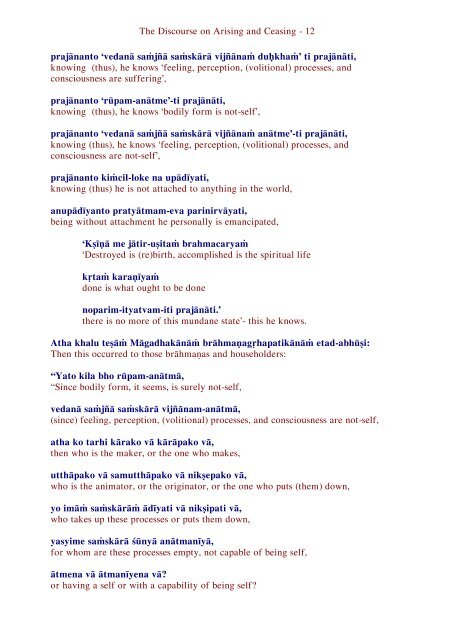Utpadyananirudhyanasūtram,The Discourse on Arising and Ceasing
A Sanskritised Prakrit and English line by line (interlinear) version of the fourth discourse of the Buddha from Mahāvastu, which goes unrecorded in the Pāli texts.
A Sanskritised Prakrit and English line by line (interlinear) version of the fourth discourse of the Buddha from Mahāvastu, which goes unrecorded in the Pāli texts.
Create successful ePaper yourself
Turn your PDF publications into a flip-book with our unique Google optimized e-Paper software.
<str<strong>on</strong>g>The</str<strong>on</strong>g> <str<strong>on</strong>g>Discourse</str<strong>on</strong>g> <strong>on</strong> <strong>Arising</strong> <strong>and</strong> <strong>Ceasing</strong> - 12<br />
prajānanto ‘vedanā saṁjñā saṁskārā vijñānaṁ duḥkhaṁ’ ti prajānāti,<br />
knowing (thus), he knows ‘feeling, percepti<strong>on</strong>, (voliti<strong>on</strong>al) processes, <strong>and</strong><br />
c<strong>on</strong>sciousness are suffering’,<br />
prajānanto ‘rūpam-anātme’-ti prajānāti,<br />
knowing (thus), he knows ‘bodily form is not-self’,<br />
prajānanto ‘vedanā saṁjñā saṁskārā vijñānaṁ anātme’-ti prajānāti,<br />
knowing (thus), he knows ‘feeling, percepti<strong>on</strong>, (voliti<strong>on</strong>al) processes, <strong>and</strong><br />
c<strong>on</strong>sciousness are not-self’,<br />
prajānanto kiṁcil-loke na upādīyati,<br />
knowing (thus) he is not attached to anything in the world,<br />
anupādīyanto pratyātmam-eva parinirvāyati,<br />
being without attachment he pers<strong>on</strong>ally is emancipated,<br />
‘Kṣīṇā me jātir-uṣitaṁ brahmacaryaṁ<br />
‘Destroyed is (re)birth, accomplished is the spiritual life<br />
kṛtaṁ karaṇīyaṁ<br />
d<strong>on</strong>e is what ought to be d<strong>on</strong>e<br />
noparim-ityatvam-iti prajānāti.’<br />
there is no more of this mundane state’- this he knows.<br />
Atha khalu teṣāṁ Māgadhakānāṁ brāhmaṇagṛhapatikānāṁ etad-abhūṣi:<br />
<str<strong>on</strong>g>The</str<strong>on</strong>g>n this occurred to those brāhmaṇas <strong>and</strong> householders:<br />
“Yato kila bho rūpam-anātmā,<br />
“Since bodily form, it seems, is surely not-self,<br />
vedanā saṁjñā saṁskārā vijñānam-anātmā,<br />
(since) feeling, percepti<strong>on</strong>, (voliti<strong>on</strong>al) processes, <strong>and</strong> c<strong>on</strong>sciousness are not-self,<br />
atha ko tarhi kārako vā kārāpako vā,<br />
then who is the maker, or the <strong>on</strong>e who makes,<br />
utthāpako vā samutthāpako vā nikṣepako vā,<br />
who is the animator, or the originator, or the <strong>on</strong>e who puts (them) down,<br />
yo imāṁ saṁskārāṁ ādīyati vā nikṣipati vā,<br />
who takes up these processes or puts them down,<br />
yasyime saṁskārā śūnyā anātmanīyā,<br />
for whom are these processes empty, not capable of being self,<br />
ātmena vā ātmanīyena vā?<br />
or having a self or with a capability of being self?


















